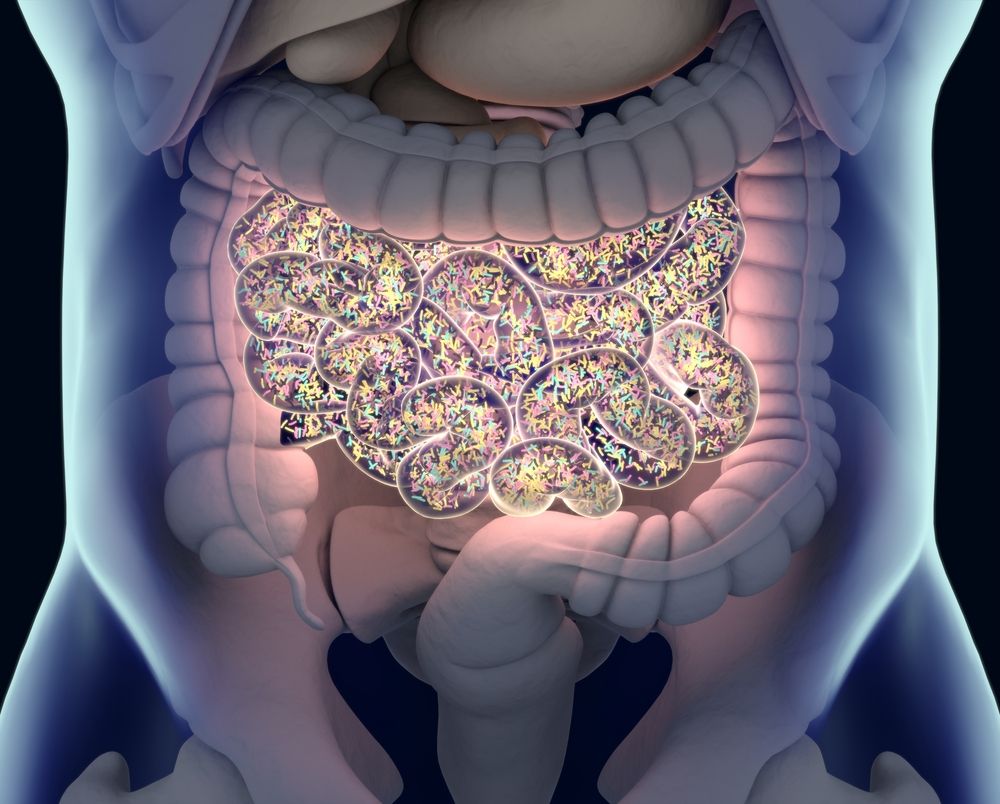The collective number of microorganisms in your body is referred to as the microbiome. (Learn More – The Microbiome)
The bacteria in your intestine (or gut) are the most widely studied of these microorganisms, and they affect your health in numerous ways. (Learn More – Gut Microbiome)
The development of the gut microbiome starts with early exposure to microorganisms in the womb, and this exposure continues as you grow. (Learn More – How Did I Get These?)
Gut microbiomes are involved in numerous aspects of your health, including the development of certain intestinal conditions like inflammatory bowel disease, (Learn More – The Gut Microbiome Can Affect IBS or IBD) maintaining a healthy weight and the development of disorders like diabetes, (Learn More – Weight Issues and Diabetes) your cardiovascular health, (Learn More –Cardiovascular Health) your immune system, (Learn More – Immune System Functioning) and the functioning of your brain. (Learn More – The Brain)
You can improve the quality of the microorganisms in your gut by following some simple rules. (Learn More – How to Improve the Quantity and Quality of Beneficial Microorganisms in Your Gut)
The Microbiome
Very small organisms like bacteria, fungi, and viruses are often referred to as microorganisms (microbes). We have trillions of these tiny organisms living inside our body, and the term for all these organisms as a group is the microbiome.
While some of these microbes are harmful, a large number of these organisms affect your health in a positive way.
Gut Microbiome
You have more bacteria living inside your body than human cells. Most of your microorganisms are located in your intestines, specifically in the area of the large intestine known as the cecum. The microorganisms in this area are often referred to collectively as the gut microbiome.
There may be 1,000 species of bacteria or more involved in the human gut microbiome. Many of them are extremely important for your health.
These gut microorganisms are among the most studied of all the microbes that live inside the body.
How Did I Get These?
There is probably an evolutionary tie to the microbes that live inside your body and contribute to maintaining your health. When you are born, you are exposed to microbes during birth, but you may also be exposed to microbes while you are inside the womb.
Research suggests that the diversity of microbes in your intestine is good for you. As they expand, it can affect your health in a number of ways, including:
-
- Helping you digest breast milk as a child
- Helping you digest fiber
- Aiding in the development of the brain and spinal cord
- Boosting your immune system
The Gut Microbiome Can Affect IBS or IBD
The microbiome in your gut might play a role in the development of irritable bowel syndrome (IBS) or inflammatory bowel disease (IBD).
Gut dysbiosis occurs when you have an imbalance of unhealthy microbes versus healthy microbes. Such an imbalance can contribute to various types of intestinal disorders or diseases.
 For instance, abdominal pain, cramps, and bloating that occur with IBS may be due to gas produced by microbes in the gut. However, certain microbes like Lactobacilli (found in yogurt) or Bifidobacteria (a probiotic) can help prevent or even reduce the symptoms of IBS. They can also keep disease from spreading bacteria and sticking to your intestinal walls.
For instance, abdominal pain, cramps, and bloating that occur with IBS may be due to gas produced by microbes in the gut. However, certain microbes like Lactobacilli (found in yogurt) or Bifidobacteria (a probiotic) can help prevent or even reduce the symptoms of IBS. They can also keep disease from spreading bacteria and sticking to your intestinal walls.
Weight Issues and Diabetes
If you are overweight, gut dysbiosis might be a contributing factor. Twin studies, where each twin had different types and amounts of gut microorganisms, suggest that some of the bacteria found in the gut may lead to a greater risk of obesity, while other bacteria may not. Moreover, the gut bacteria differences between twins were not due to genetics, but rather environmental issues like diet.
The findings suggest that the use of probiotics may help with weight loss, but these effects may be negligible in many cases.
Research studies looking at the risk of infants developing diabetes found that the diversity of the microbiome in children’s guts suddenly declined right before the onset of type I diabetes, and the number of unhealthy bacteria increased; increasing the diversity and amount of bacteria in the gut and using probiotics may therefore help control diabetes.
Cardiovascular Health
Research studies have suggested that the gut microbiome may affect the health of your heart and cardiovascular system. Gut microbiomes may lead to increased production of good cholesterol, potentially reducing the risk of heart disease.
Other bacteria in the gut may be responsible for producing chemicals that can increase the risk of blockages in the veins and arteries. Reducing these bacteria or offsetting them with probiotics may decrease this risk.
Immune System Functioning
There is an extensive body of research that has established a connection between the gut microbiome and the functioning of the immune system. Here are some of the findings:
- People with rheumatoid arthritis (RA) may have a less diverse collection of microbes in the gut than people without the disease. The level of microorganism diversity in the gut appears to be associated with the disease’s duration.
- The presence of the bacterium Prevotella histicola, which is found in the human gut, is believed to suppress arthritic symptoms in animals.
- Research findings suggest that there is a relationship between gut bacteria and autoimmune disease in animals. One particular bacterium, E. gallinarum, may be associated with inflammation and issues with immune system function.
The Brain
The gut microbiome may affect brain functioning by:
- Facilitating the production of neurotransmitters like serotonin, which is mostly produced in the
 intestines.
intestines. - Assisting in the neural transmission as the gut and brain are connected extensively with millions of nerves.
- Affecting mental health as certain types of psychological disorders are associated with different species of bacteria in the gut compared to people without these disorders.
It may be possible to improve issues with depressed mood through the use of probiotics.
Ways to Improve the Quantity and Quality of Beneficial Microorganisms in Your Gut
You can add to the beneficial bacteria in your gut and reduce the presence of harmful bacteria by following some simple practices:
- Eliminate or significantly reduce the use of artificial sweeteners. They can increase blood sugar levels by stimulating the growth of unhealthy bacteria species in the intestine.
- Eat more whole grains. They contain fiber and can help reduce the risk of diseases and disorders that affect gut bacteria.
- Eat more vegetables, which can reduce the levels of disease-causing bacteria, such as E. coli, and reduce inflammation.
- Eat substances that contain high levels of polyphenols, such as green tea, olive oil, whole grains, and dark chocolate. These foods can stimulate healthy bacteria growth in the intestine.
- Eat fermented foods like yogurt or sauerkraut. They contain healthy bacteria like Lactobacilli and can lower the levels of harmful bacteria in the intestine.
- Eat more prebiotic foods, which stimulate the growth of healthy bacteria in your intestine. Foods like asparagus, bananas, oats, apples, and artichokes can help.
- Limit the use of antibiotics, which kill harmful bacteria and microorganisms as well as healthy microorganisms.
- Vary your diet so you are eating a diverse range of foods. This can promote the growth of healthy bacteria in your gut.
- Use a probiotic supplement.
References
The human microbiome: Why our microbes could be key to our health. (August 2018). The Guardian.
The Integrative Human Microbiome Project: Dynamic Analysis of Microbiome-Host Omics Profiles During Periods of Human Health and Disease. (September 2014). Cell Host & Microbe.
Succession of Microbial Consortia in the Developing Infant Gut Microbiome. (March 2011). Proceedings of the National Academy of Science.
Probiotics for the Treatment of Irritable Bowel Syndrome–Focus on Lactic Acid Bacteria. (February 2012). Alimentary Pharmacology & Therapeutics.
Gut Microbiota, Obesity and Diabetes. (May 2016). Postgraduate Medical Journal.
The Gut Microbiome Contributes to a Substantial Proportion of the Variation in Blood Lipids. (October 2015). Circulation Research.
A Healthy Immune System Could Have Roots in Your Gut. (August 2018). uBiome.
The Brain-Gut-Microbiome Axis. (January 2018). Cellular and Molecular Gastroenterology and Hepatology.
10 Beneficial Ways to Improve gut Health. (May 2019). Healthline.


 intestines.
intestines. 







